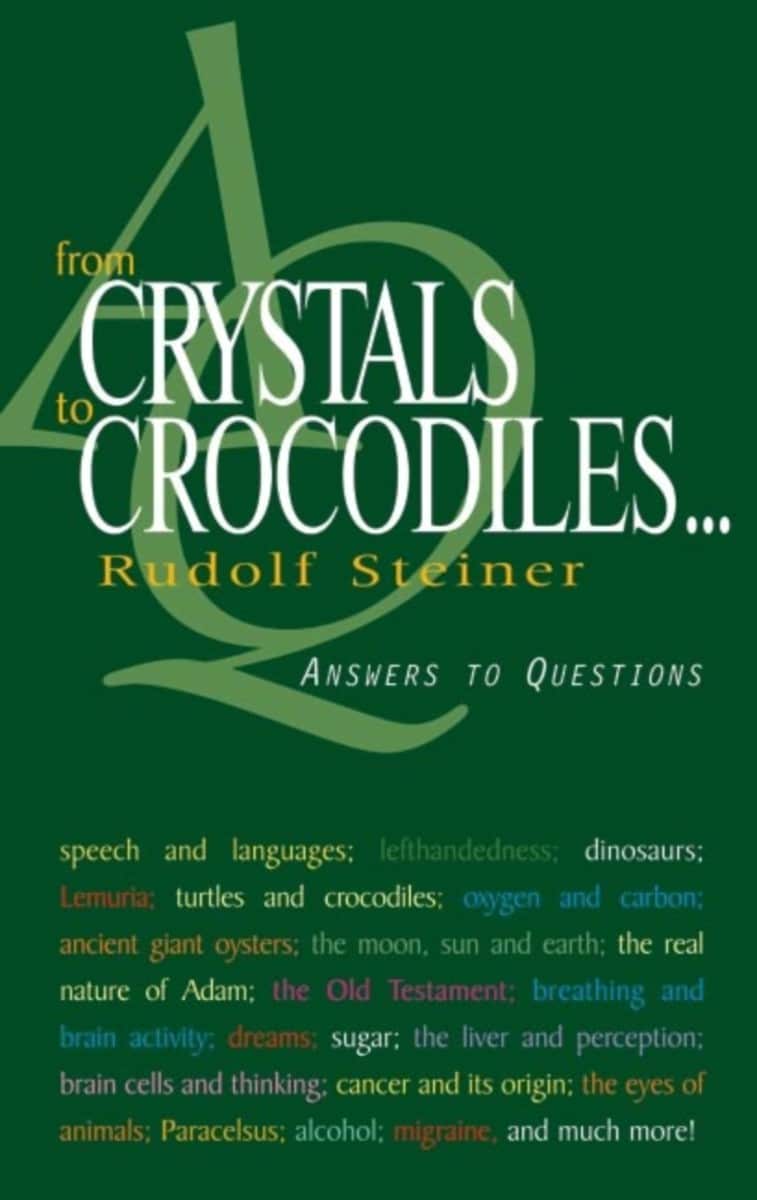From Crystals to Crocodiles…Answers to Questions
10 lectures, Dornach, August 2 – September 30, 1922 (CW 347)
The remarkable discussions in these two volumes took place between Rudolf Steiner and workers at the Goetheanum, Switzerland, who chose the varied subject matter. The astonishing nature of his responses the questions—their insight, knowledge, and spiritual depth—is testimony to his outstanding ability as a spiritual initiate and teacher.
Accessible and stimulating, the records of these sessions are both entertaining and profound. In this volume, Steiner discusses:
- speech and languages;
- lefthandedness;
- dinosaurs;
- Lemuria;
- turtles and crocodiles;
- oxygen and carbon;
- ancient giant oysters;
- the moon, sun, and earth;
- the Old Testament;
- the real nature of Adam;
- breathing and brain activity;
- dreams; sugar;
- the liver and perception;
- brain cells and thinking;
- illnesses such as cancer and its origin, migraines, and diabetes;
- the eyes of animals;
- Paracelsus;
- alcohol,
- and more.
This book is a translation of Die Erkenntnis des Menschenwesens nach Leib, Seele und Geist. Über frühe Erdzustände (GA 347).
C O N T E N T S:
1. Discussion of August 2, 1922: “On the origin of speech and languages”: Broca’s discovery; language learning in children; imitation; left-handedness and the pedagogical response to it; relationship of languages in various regions of the earth to the cosmos
2. Discussion of August 5, 1922: “On the human etheric body: Relationship between brain and thinking”: Nutrition—destruction and revitalization of food; consciousness and its connection with the ratio of white blood cells and red ones; thinking activity during sleep; the breathing process and its connection to brain activity; perception of dreams
3. Discussion of August 9, 1922: “The human being in relation to world formation and dissolution”: Origin of thoughts; formation of crystals; sugar and dissolving of sugar
4. Discussion of September 9, 1922: “The human being as body, soul, and spirit: Brain and thinking”: Life in brain cells and in white blood corpuscles; dying away of life in brain cells as precondition for thinking; continuous replacement of matter and tissue in the human organism; cancer and its origin; over taxing the memory in childhood and its relation to illness in later life
5. Discussion of September 13, 1922: “The perception and thinking carried out by our inner organs”: Hardening of the brain; diabetes; special character of the liver; the liver as our inner eye; the eyes of animals as thinking organs; the Roman Janus heads
6. Discussion of September 16, 1922: “The processes of digestion in physical as well as soul-spiritual terms”: Transformation of substances; on Paracelsus; alcohol; the causes of migraine; the major difference between human beings and animals; salts and phosphorus as the most important substances in the human brain; salts and their connection to thinking; phosphorus and its relation to willing
7. Discussion of September 20, 1922: “On early Earth conditions (Lemuria)”: Dragon birds, ichthyosaurs, and plesiosaurs; birds, herbivorous animals, and megatheria; the Earth—a dead gigantic animal
8. Discussion of September 23, 1922: “On early Earth conditions”: Turtles and crocodiles; healing instincts of animals; oxygen and carbon and their relation to plants and forests; the huge oysters living in the muddy earth soup; the Moon—imagination and reproductive forces; the Moon inside the Earth and its expulsion; preservation of Moon substance in the reproductive force of animals and human beings
9. Discussion of September 27, 1922: “The earliest times on Earth”: The Earth before the expulsion of the Moon; the Sun as fertilizing force; storing the Sun forces inside the Earth and the reproductive forces of earth creatures; the influence of the Sun on the reproduction of plants and animals; the influence of the Moon on weather; Earth, Sun, and Moon as unified entity; the Earth as a living being
10. Discussion of September 30, 1922: “Adam Kadmon in Lemuria”: The Earth once was like a huge human head; the Earth received nourishment from the cosmos in the past and from the Sun now; the head of the human embryo as picture of the Earth; the human being was at one time the whole Earth; why people are so small; we are all descended from one ancestor; misinterpretations of the Old Testament
About the Author
Rudolf Steiner (1861–1925) was born in the small village of Kraljevec, Austro-Hungarian Empire (now in Croatia), where he grew up (see right). As a young man, he lived in Weimar and Berlin, where he became a well-published scientific, literary, and philosophical scholar, known especially for his work with Goethe’s scientific writings. At the beginning of the twentieth century, he began to develop his early philosophical principles into an approach to systematic research into psychological and spiritual phenomena. Formally beginning his spiritual teaching career under the auspices of the Theosophical Society, Steiner came to use the term Anthroposophy (and spiritual science) for his philosophy, spiritual research, and findings. The influence of Steiner’s multifaceted genius has led to innovative and holistic approaches in medicine, various therapies, philosophy, religious renewal, Waldorf education, education for special needs, threefold economics, biodynamic agriculture, Goethean science, architecture, and the arts of drama, speech, and eurythmy. In 1924, Rudolf Steiner founded the General Anthroposophical Society, which today has branches throughout the world. He died in Dornach, Switzerland.
Matthew Barton is a translator, editor, teacher, and poet, and taught kindergarten for many years at the Bristol Waldorf School. His first collection of poems was Learning To Row (1999). He has won numerous prizes for his work, including an Arts Council Writer’s Award and a Hawthornden Fellowship.














Jonathan R. (verified owner) –